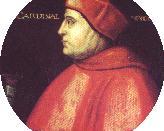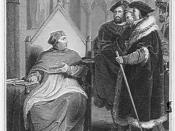Henry VIII succeeded his father to the throne at a very early age, with a correspondingly naïve fairy tale view of a war like king; seeking power and glory. He implemented these aims through an aggressive foreign policy in the first five years of his reign until Wolsey came and directed Henry's glory attitude to a more moderate form of diplomacy. So it could be said that Wolsey was the main factor that influenced the conduct of foreign affairs in the later part of this period.
Henry thought that war would reunite his people and establish himself as king in a strong definite way. Henry gained an ally, Ferdinand of Aragon through marrying Catherine of Aragon, his brother's widow. Although France was posing no threat to England; English troops still invaded in 1513 capturing the towns of Therouanne and Tournai. French troops fled quickly hence the battle being named the "Battle of the Spurs".
Also in 1513 the Scottish King James IV was killed at the Flodden Field. This left the regency for James V in the hands of his mother, who was conveniently Henry's sister, Margaret. These victories strengthened the English nobility, which was later to become increasingly important in Henry's time; through the French invasion an administrative genius emerged and his name was Thomas Wolsey.
Wolsey had a passion for foreign affairs. He wanted to be a peacemaker, statesman and honest broker. Wolsey's main aim behind his pomp arrogant attitude was to stop England going to war in Europe. Wolsey wanted England to have an active foreign policy but stop before it got to the point of war.
Ultimately, the hostility between France and Spain meant that England had no fears of invasion and every chance of being treated with respect. Because both France and Spain were searching...


